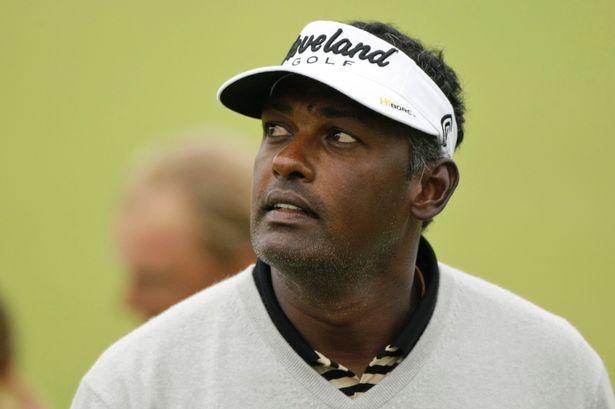In the midst of last week’s arbitration ruling that labeled Jimmy Graham a “tight end” and today’s probate hearing that may or may not play a significant role in the future landscape of the NBA, one Sports Law news story that has been constantly set aside is the ongoing lawsuit against the PGA Tour initiated by 34-time Tour winner and member of the World Golf Hall of Fame, Vijay Singh.
For those unfamiliar, the lawsuit originally stems from the Tour suspending Singh after he admitted to taking deer antler spray – a supplement believed to contain the banned substance, IGF-1 – in a January 2013 Sports Illustrated article. The PGA Tour suspended Singh for 90 days, but later dropped its case when the World Anti-Doping Agency (WADA) stated deer antler spray was no longer a concern and removed the item from its list of banned substances. In a lawsuit filed in May 2013, Singh sued the Tour for “disparate treatment,” alleging that he was treated differently from other golfers who violated the Tour’s drug-testing program and that he was “humiliated, ashamed, ridiculed, scorned and [made] emotionally distraught” due to the Tour’s action.
The most damning roadblock to the advancement of this proceeding through the court system has been the constant quibbling on both sides regarding the appropriate scope of Singh’s discovery requests. Federal Rule of Civil Procedure 26 (b) defines the appropriate scope of discovery for any particular litigation as follows:
[p]arties may obtain discovery regarding any nonprivileged matter that is relevant to any party’s claim or defense—including the existence, description, nature, custody, condition, and location of any documents or other tangible things and the identity and location of persons who may know of any discoverable matter….Relevant information need not be admissible at the trial if the discovery appears reasonably calculated to lead to the discovery of admissible evidence.
Consequently, for Singh’s discovery requests to be deemed proper, each request must relate in some form, shape or manner to his claim of disparate treatment by the PGA Tour relating to how the Tour doles out punishment for violating terms of its anti-drug policy. Courts tend to look at the issues as framed through the pleadings in a particular action to help determine the appropriate scope of discovery.
Singh’s original discovery requests center on details regarding how the Tour administered its drug-testing program; such requests would make information detailing how the PGA Tour decides to punish its golfers publicly available. In a recently issued court decision, Justice Eileen Branstein of the New York State Supreme Court delivered what many consider a significant blow to Singh’s case by deciding to limit the scope of discovery to the PGA Tour’s policies and penalties for the use of the growth hormone IGF-1. As a result, the court effectively stated that the PGA Tour’s handling of punishments relating to other banned substances was not relevant and that the Tour is not to be compelled to answer any discovery request that seeks information about any positive tests by any golfer for any banned substance that is not IGF-1. Justice Branstein’s ruling means Singh must now supplement his argument by showing how the Tour treated differently those golfers connected to deer antler spray or IGF-1, a much smaller pool for comparison that may make it difficult for the golfer to show how the Tour hands out punishments arbitrarily and not in line with any established system.
Singh’s attorney, Peter Ginsberg, refuses to view this recent decision as a step back for his client’s claim. Ginsberg has stated that, despite the fact Justice Branstein’s decision limits his client’s discovery requests to a specific area of the Tour’s anti-drug program, he has been conducting his own investigation that may lead to filing new claims against the Tour. Having now learned what the current scope of discovery is to entail, Ginsberg has the ability to seek highly-coveted information by filing additional claims in congruence with the new findings from his personal investigation. These new claims would have to attack the PGA Tour’s administration of its anti-drug program, as a whole, as erratic and foundation-less in order to seek discovery that would shed light on the entirety of the program, instead of just one particular section.
With golf set to join the Olympics in 2016, the transparency (or lack thereof) of the Tour’s anti-drug program is what makes Singh’s case interesting, not only domestically but internationally as well. Currently, the Tour’s official policy is to report anti-doping rules violations to the public only if that violation results in a suspension. If there is no suspension, there is no announcement. Accordingly, it is not unimaginable for a golfer to be privately punished for taking a banned substance that does not warrant suspension and have his competitors ignorant to this fact. If the potential new claims alluded to by Peter Ginsberg allow Singh to pursue discovery that would enable access to the PGA Tour’s confidential anti-doping policies and practices, look for the sport’s looming inclusion in the 2016 Summer Olympics to play a factor in how much the PGA Tour is willing to pay Vijay Singh to make his claims go away.

